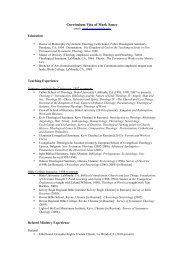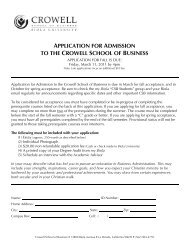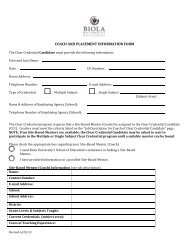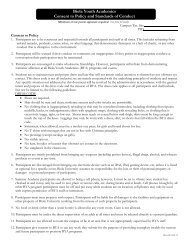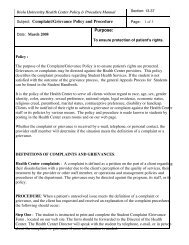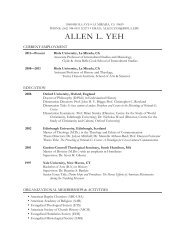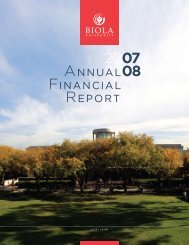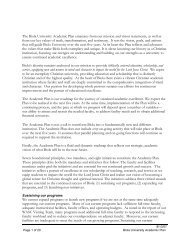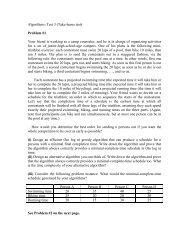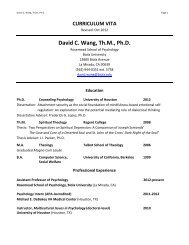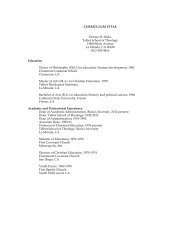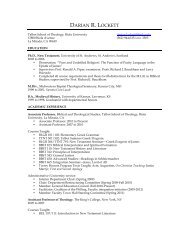Program Handbook (PDF) - Biola University
Program Handbook (PDF) - Biola University
Program Handbook (PDF) - Biola University
Create successful ePaper yourself
Turn your PDF publications into a flip-book with our unique Google optimized e-Paper software.
COOK SCHOOL OF INTERCULTURAL STUDIES <br />
GRADUATE PROGRAM HANDBOOKS <br />
ALCOHOL, TOBACCO AND DRUGS SECTION 2.3<br />
(policy modified Feb 2013)<br />
Philosophy<br />
<strong>Biola</strong> <strong>University</strong> seeks to foster an alcohol-and-drug-free environment in which to work, live, learn, and<br />
grow. As a Christian <strong>University</strong>, we approach alcohol and other drug abuse with a combination of<br />
compassion, encouragement, directness, and concerned firmness. An aspect of this caring approach is the<br />
consistent enforcement of the regulations on alcohol and other drugs and substances contained within this<br />
policy. The purpose of this policy is to ensure a safe environment that is consistent with the mission of the<br />
<strong>University</strong> and its goal to foster an alcohol-and drug-free environment. The use, possession or distribution<br />
of alcoholic beverages, illicit drugs, or other controlled substances (including misuse of prescribed<br />
medications or use of any substance with the intent of becoming impaired/intoxicated) by students of <strong>Biola</strong><br />
is prohibited and violates this policy as well as the <strong>University</strong>’s standard of conduct. <strong>Biola</strong> <strong>University</strong> is<br />
operating in conformity with the Drug-Free Schools and Communities Act of 1989 (Public Law 101-336)<br />
and Drug-Free Workplace Act of 1988. The following summarizes <strong>Biola</strong>’s policy and program:<br />
Health & Lifestyle Risks<br />
The use or abuse of alcohol and other drugs/substances could increase the risk for a number of health<br />
related and other medical, behavioral, and social problems. These include the acute health problems related<br />
to intoxication or overdose (blackouts, convulsions, coma, death); physical and psychological dependence;<br />
malnutrition; long-term health problems, including cirrhosis of the liver, organic brain damage, high blood<br />
pressure, heart disease, ulcers, and cancer of the liver, mouth, throat, and stomach; contracting diseases<br />
such as AIDS through the sharing of hypodermic needles; pregnancy problems including miscarriages, still<br />
birth and learning disabilities; fetal alcohol syndrome; psychological or psychiatric problems; diminished<br />
behaviors (hangovers, hallucinations, disorientation, slurred speech); unusual or inappropriate risk-taking,<br />
which may result in physical injury or death; violent behavior towards others, such as assault or rape;<br />
accidents caused by operating machinery while impaired; impaired driving resulting in alcohol and drugrelated<br />
arrest, traffic accidents, injuries, and fatalities; negative effects on academic and work performance;<br />
conflicts with co-workers, classmates, family, friends, and others; conduct problems resulting in<br />
disciplinary actions, including loss of employment; and legal problems including imprisonment.<br />
Sanctions Regarding Alcohol And Other Drugs<br />
Students violating this policy are subject to disciplinary sanctions including but not limited to: substance<br />
abuse education programs, research papers, restitution, community service, fines, removal from housing,<br />
ban from residential housing, or dismissal from the <strong>University</strong> in accordance with university policies and<br />
procedures. When deemed appropriate, students may be assessed for and/or referred to more intensive<br />
alcohol and/or substance abuse recovery programs.<br />
In addition to the <strong>University</strong> process, the <strong>University</strong> will involve local law enforcement officials when<br />
appropriate. The following California Health and Safety Codes pertain to the Illegal possession, use, or<br />
distribution or illicit drugs and substances, or illegal use or possession of alcohol, which is punishable<br />
under applicable local, state, and federal law.<br />
• The California Health & Safety Code states that “Every person who possesses any controlled<br />
substance shall be punished by imprisonment in the state prison for a minimum of one year” (H & S<br />
11350), and, “Every person who possesses for sale, or purchases for sale, any controlled substance shall be<br />
punished by imprisonment in the state prison for two to four years” (H & S 11351).



